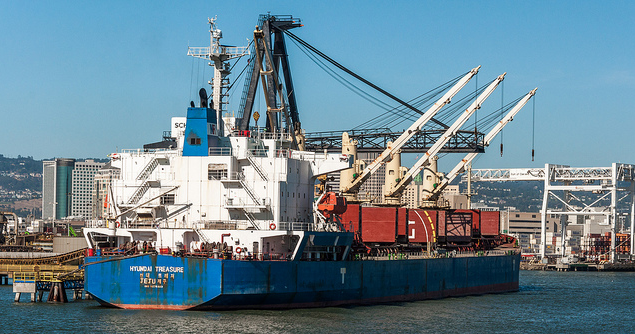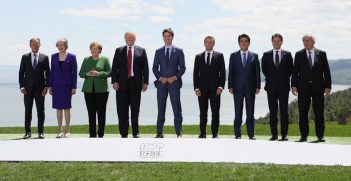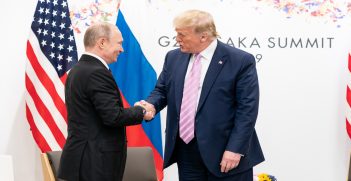Corporations, Sovereignty and Trade Agreements

With excitement building up about the Trans-Pacific Partnership, Australia’s former Trade Minister Craig Emerson discusses Investor State Dispute Settlement.
The right of a corporation to sue another country’s government is known as Investor State Dispute Settlement (ISDS). Its origins were the protection of corporate assets, such as copper mines, from expropriation. But as it has evolved, ISDS has come to apply to indirect expropriation, which potentially is any government decision or regulation that adversely affects the actual or expected profits of a corporation.
Prime Ministers Howard and Gillard opposed it. So does the Productivity Commission and the Australian Treasury. But the Abbott Government has agreed to allow corporations from Korea and China to sue it for impairing their profit streams. Having set these precedents, it will be exceptionally difficult to say no to the United States in the final negotiations for the Trans-Pacific Partnership.
Of course there are safeguards. The standard safeguard is that government regulations and decisions designed to protect legitimate public welfare objectives such as health, safety and the environment do not constitute grounds for a foreign corporation to sue the Australian Government – “except in rare circumstances”. But corporations seeking to take legal action against a government are likely to claim theirs are “rare circumstances”. If successful in making that claim they will have negated the safeguard.
ISDS provisions in trade and investment agreements afford foreign corporations the right to take international legal action against governments that have regulated for health and environmental protection. Domestic corporations have no such rights. ISDS cases are pursued not in properly constituted international courts but through panels especially formed to hear a specific case.
As Chief Justice of the High Court of Australia, Robert French, has pointed out: “Arbitral tribunals set up under ISDS provisions are not courts. Nor are they required to act like courts. Yet their decisions may include awards which significantly impact on national economies and on regulatory systems within nation states.”
In 2014, ISDS tribunals issued 42 decisions, taking the total number of concluded ISDS cases to 356, with 37 per cent deciding in favour of the state, 25 per cent in favour of the investor and 28 per cent of cases settled. A further 42 new ISDS cases were initiated in 2014.
In a 2010 report on trade agreements, the Productivity Commission warned against Australia including ISDS provisions in future agreements: “There does not appear to be an underlying economic problem that necessitates the inclusion of ISDS provisions within agreements. Available evidence does not suggest that ISDS provisions have a significant impact on investment flows.” Based on this assessment, supported by Treasury advice, the Gillard Government announced in April 2011 that it would not agree to ISDS provisions in future trade agreements.
Despite placing a high priority on concluding a free trade agreement with Korea, the Gillard Government would not accede to Korea’s insistence that the agreement include ISDS. Prime Minister Gillard also made clear in writing that the Government would not agree to ISDS provisions in the Trans-Pacific Partnership (TPP) being negotiated with the United States and ten other countries.
Negotiations for the Korea Australia Free Trade Agreement were all but complete at the time of the change of leadership in June 2013, the only real sticking point being ISDS. Following its election the Abbott Government moved quickly to agree to ISDS and the trade deal was concluded.
Japan was not insisting on ISDS in negotiations for a Japan Australia Free Trade Agreement. Nor was China. However, China wanted the best of the deals struck with Korea and Japan. Since the agreement with Korea included ISDS, China wanted it too, so the Abbott Government agreed.
Trade agreements are notoriously difficult to get through the US Congress, especially without American business support. A top priority for American business is the inclusion of ISDS provisions in the TPP. This was the case as well in 2004 in the US Australia Free Trade Agreement, but Prime Minister Howard said no, instead agreeing to lift the minimum size of US investments that would be subject to approval from the Foreign Investment Review Board from less than $250 million to more than $1 billion. Having secured the lift in the screening threshold for investment, American business now wants more, demanding that Australia agree to ISDS in the TPP.
An early advocate of including ISDS provisions in the TPP was the tobacco company, Philip Morris. It had strenuously objected to Australia’s proposed plain packaging laws and wanted to use ISDS in the TPP to take the Australian Government to an international tribunal. In the meantime, Philip Morris has identified an old investment agreement between Australia and Hong Kong that contains ISDS provisions and is using that vehicle to pursue the Australian Government.
Nobel Laureate Professor Joseph Stiglitz has warned against ISDS: “Even when developing-country governments win the suits (which have proliferated greatly in the last 15 years), the litigation costs are huge. The (intended) effect is to chill governments’ legitimate efforts to protect and advance citizens’ interests by imposing regulations, taxation and other responsibilities on corporations.”
Indeed, ISDS action can be triggered not only in response to decisions and regulations of national governments but of provincial, state and local governments as well. The action is taken against the national government as signatory to the trade or investment agreement, but all levels of government are similarly constrained by ISDS provisions. An adverse state government ruling as a result of an environmental impact assessment or a local council planning or zoning decision can therefore be the subject of ISDS action by a foreign corporation.
Australia has agreed to ISDS provisions in trade agreements with Singapore, Thailand, Chile, the 10 ASEAN countries, Korea and China, as well as in 21 investment agreements. Some of these agreements were negotiated by Labor governments, others by Coalition governments. It could be argued that there is no point shutting the gate now. The alternative argument is that not all the horses have bolted and letting them out now would validate earlier decisions to the detriment of Australia’s national sovereignty. What is clear is that ISDS provisions have not been and still are not getting the public attention they deserve in discussions about the merits of particular trade and investment agreements.
Craig Emerson is Managing Director of Craig Emerson Economics and Adjunct Professor at Victoria University’s School of Business. He was Australia’s Trade Minister from 2010 until 2013.





